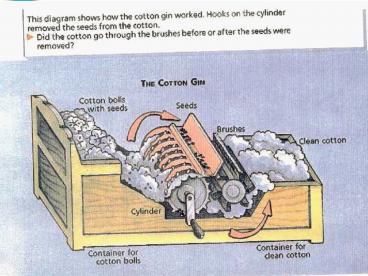Slavery in Antebellum America - PowerPoint PPT Presentation
1 / 39
Title:
Slavery in Antebellum America
Description:
Some industry: Tredegar Iron Works used slave labor. ... Very Rare Individual Violence--Frederick Douglass Perhaps more prevalent Hard to quantify Resistance ... – PowerPoint PPT presentation
Number of Views:170
Avg rating:3.0/5.0
Title: Slavery in Antebellum America
1
(No Transcript)
2
(No Transcript)
3
(No Transcript)
4
(No Transcript)
5
(No Transcript)
6
Slavery in Antebellum America
- The 3 Souths
7
Border South DE, MD, KY MO
- 22 of families owned on average 5 slaves
- 1 of Souths ultra-wealthy
- 6 of large (20 slaves) plantations found in
region. - Slaves made up 17 of the population 21 of
African American population free.
8
Border South DE, MD, KY MO
- Little cotton cultivation tobacco, grain
industrial products. - Unionists prevailed after Lincolns election
throughout Civil War.
9
Middle South VA, NC, TN AR
- 36 of families owned on average 8 slaves
- 14 of Souths ultra-wealthy
- 32 of large (20 slaves) plantations found
primarily in eastern VA western TN. - Slaves made up 30 of the population.
10
Middle South VA, NC, TN AR
- Different sections, some resembling Deep South,
others Border South. - Some industry Tredegar Iron Works used slave
labor. - Unionists prevailed after Lincolns election, but
Secessionists prevailed after Fort Sumter early
hostilities.
11
Deep South SC, FL, GA, AL, MS, LA TX
- 43 of families owned on average 12 slaves
- 85 of the Souths ultra-wealthy
- 62 of large (20 slaves) plantations
- Slaves made up 47 of the population.
12
Deep South SC, FL, GA, AL, MS, LA TX
- Most slaves concentrated in the Black Belt,
especially along river valleys - 95 of the Souths cotton almost all of its
sugar, rice indigo grown in Deep South. - Secessionists prevailed immediately after
Lincolns election.
13
Historiography
- The Peculiar Institution in Antebellum America
14
Main Debates on History of Peculiar Institution
- Which came first slavery or racism?
- Was slavery economically viable?
- Was it an economic system of labor exploitation
or a social system for racial control? - What were the tools of oppression? Centrality of
violence? - What were the tools of resistance? Revolts
escapes?
15
Positive Paternalism
- Earliest interpretation, developed by U.B.
Phillips Southern historians analyzing
multi-racial communities of the South - Argued that slaves masters loved respected
each other. - Slavery served as essential civilizing
institution. - Clearly racist aspects have been excised but
romantic notion of the Southern Lost Cause
persists.
16
(No Transcript)
17
Factories in the Fields
- Economic interpretation proposed by Marxist
historians, such as Kenneth Stampp. - Saw mode of production as the motor of history
- Slaves were workers nothing more defined by
lives in the fields. - Minimized racial purpose of slavery presented
hopeful vision of post-slavery America once
economic system changed.
18
American Concentration Camps
- Historians led by Stanley Elkins utilized
understanding of human nature based on recent
history of the Holocaust. - Saw absolute nature of slavery its impact on
slaves infantilization, creation of Sambo
archetype. - Saw little room for autonomy in slave existence.
- Presented pessimistic vision of post-slavery
America.
19
(No Transcript)
20
(No Transcript)
21
Oppressive Cage of Paternalism
- Paternalism existed as a tool of oppression
survival. - No real love respect between slaves masters,
except in a few individual, isolated instances. - Institutional support of systemreligion, slave
culture, etc.designed to reinforce these
relationships.
22
Oppressive Cage of Paternalism
- Complexity of social cultural forms in slave
life defined by - Type of production (Gang or Task system)
- Regions (Tidewater, Black Belt)
- Different Worlds (Sunup-Sundown Sundown-Sunup)
23
(No Transcript)
24
(No Transcript)
25
(No Transcript)
26
(No Transcript)
27
(No Transcript)
28
(No Transcript)
29
Oppression
- Centrality of Violence
- Need not be everyday or extreme
- Threat of violence or token violence
- Women often the target of sexual violence.
- Absolute authority of the master is
unquestionable. - Threat of Sale Separation
- Economic reality necessity
- Threat use of sale as a tool of control.
- Perhaps more absolute than violence.
30
Oppression The Very Nature of Slavery
- Its bad to belong to folks that own you soul
an body. I could tell you bout it all day, but
even then you couldnt guess the awfulness of
it. - There was no such thing as being good to slaves.
Many people were better than others, but a slave
belonged to his master there was no way to get
out of it.
31
Resistance
- Planned Rebellion
- Gabriel Prosser Nat Turner in Virginia
- Denmark Vesey in Charleston, SC.
- Very Rare
- Individual Violence--Frederick Douglass
- Perhaps more prevalent
- Hard to quantify
32
Resistance
- Weapons of the Weak
- Sabotage work slowdowns
- Putdowns snide remarks.
- Grand Theft the General Strike--Escape
- Cultural Autonomy--The ultimate resistance?
33
(No Transcript)
34
(No Transcript)
35
(No Transcript)
36
(No Transcript)
37
(No Transcript)
38
(No Transcript)
39
(No Transcript)

